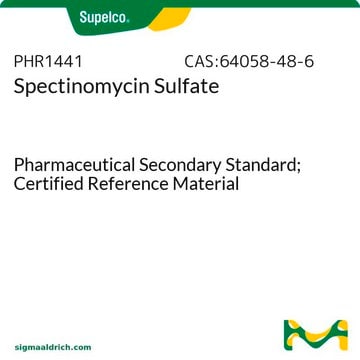S6258
Spectinomycin ready made solution
100 mg/mL in DMSO/H2O, 1:1, Cell culture tested
Synonym(s):
Actinospectacin, Espectinomicina, Spectacin, Spectam, Togamycin, Trobicin
Sign Into View Organizational & Contract Pricing
All Photos(1)
About This Item
UNSPSC Code:
12352207
NACRES:
NA.76
Recommended Products
General description
Spectinomycin is an aminocyclitol antibiotic naturally produced by Streptomyces spectabilis. Spectinomycin shows in vitro inhibitory effect (31.2μg/mL) against gram-negative and gram-positive bacteria like Escherichia coli, Klebsiella, Enterobacter, and Staphylococcus epidermidis. It acts as a protein synthesis inhibitor by binding to the bacterium′s 30S ribosomal subunit. Specifically, it interacts with 16S rRNA during the elongation process and blocks elongation factor G (EF-G), which is responsible for the translocation catalysis of peptidyl-tRNA.
Spectinomycin is used as a selective resistance marker (Spc) in Leptospira spp. The Spc marker can be used for transformation screening in leptospires from both plasmids or chromosomal integration. Spectinomycin resistance occurs through mutation of rpsE gene which encodes the protein S5, or via the aadA bacterial gene which encodes the enzyme Aminoglycoside-3"-adenyltransferase. Spectinomycin can be also used in amplification of low copy number plasmid carrying replicons (100μg/mL).
In the clinic, Spectinomycin is used as a treatment against Neisseria gonorrhoeae for both gonorrheal urethritis and cervictis.
Spectinomycin is also a plastid protein synthesis inhibitor. It is used as a specific marker (0.2-5 mg/mL) for cell layer to monitor leaf development, and is also used to generate plants deficient for the plastid-encoded RNA polymerase on MS-agar media (0.5mg/mL).Spectinomycin was also studied for cattle respiratory tract infections by Pasteurella multocida and Mannheimia haemolytica.
Technical information
1. Spectinomycin ready made solution is formulated in order to prevent freezing at -20°C, and to avoid solution precipitation under freeze-thaw cycles.
2.The suggested concentration of Spectinomycin (based on literature) in cell culture assays is 0.2-100mγ/mL. Therefore, it is recommended to dilute the ready made solution 1:1000-500,000.
Spectinomycin is used as a selective resistance marker (Spc) in Leptospira spp. The Spc marker can be used for transformation screening in leptospires from both plasmids or chromosomal integration. Spectinomycin resistance occurs through mutation of rpsE gene which encodes the protein S5, or via the aadA bacterial gene which encodes the enzyme Aminoglycoside-3"-adenyltransferase. Spectinomycin can be also used in amplification of low copy number plasmid carrying replicons (100μg/mL).
In the clinic, Spectinomycin is used as a treatment against Neisseria gonorrhoeae for both gonorrheal urethritis and cervictis.
Spectinomycin is also a plastid protein synthesis inhibitor. It is used as a specific marker (0.2-5 mg/mL) for cell layer to monitor leaf development, and is also used to generate plants deficient for the plastid-encoded RNA polymerase on MS-agar media (0.5mg/mL).Spectinomycin was also studied for cattle respiratory tract infections by Pasteurella multocida and Mannheimia haemolytica.
Technical information
1. Spectinomycin ready made solution is formulated in order to prevent freezing at -20°C, and to avoid solution precipitation under freeze-thaw cycles.
2.The suggested concentration of Spectinomycin (based on literature) in cell culture assays is 0.2-100mγ/mL. Therefore, it is recommended to dilute the ready made solution 1:1000-500,000.
Physical form
Liquid - in 1:1 DMSO:water
Storage Class Code
10 - Combustible liquids
WGK
WGK 1
Flash Point(F)
Not applicable
Flash Point(C)
Not applicable
Certificates of Analysis (COA)
Search for Certificates of Analysis (COA) by entering the products Lot/Batch Number. Lot and Batch Numbers can be found on a product’s label following the words ‘Lot’ or ‘Batch’.
Already Own This Product?
Find documentation for the products that you have recently purchased in the Document Library.
Y H Kouri et al.
Genitourinary medicine, 65(5), 342-346 (1989-10-01)
Efficacy of single-dose spectinomycin (TRO: 2 g intramuscularly) was compared with that of aqueous procaine penicillin G (APPG:4.8 x 10(6) units) plus 1 g of probenecid for treatment of gonococcal urethritis and cervicitis. Cure rates of the 210 patients who
Maria A Borovinskaya et al.
ACS chemical biology, 2(8), 545-552 (2007-08-19)
The widely used antibiotic spectinomycin inhibits bacterial protein synthesis by blocking translocation of messenger RNA and transfer RNAs on the ribosome. Here, we show that in crystals of the Escherichia coli 70S ribosome spectinomycin binding traps a distinct swiveling state
S K Wilcox et al.
Antimicrobial agents and chemotherapy, 45(11), 3046-3055 (2001-10-16)
Mutations in several ribosomal proteins are known to be related to antibiotic resistance. For several strains of Escherichia coli, the mutated protein is known but the amino acid actually altered has not been documented. Characterization of these determinants for antibiotic
Hélène Louvel et al.
Current protocols in microbiology, Chapter 12, Unit 12E-Unit 12E (2008-09-05)
The genus Leptospira belongs to the order Spirochaetales and is composed of both saprophytic and pathogenic members, such as Leptospira biflexa and L. interrogans, respectively. A major factor contributing to our ignorance of spirochetal biology has been the lack of
Albert I Ko et al.
Nature reviews. Microbiology, 7(10), 736-747 (2009-09-17)
Leptospirosis is a zoonotic disease that has emerged as an important cause of morbidity and mortality among impoverished populations. One hundred years after the discovery of the causative spirochaetal agent, little is understood about Leptospira spp. pathogenesis, which in turn
Our team of scientists has experience in all areas of research including Life Science, Material Science, Chemical Synthesis, Chromatography, Analytical and many others.
Contact Technical Service




